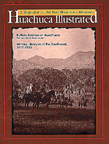 Huachuca
Illustrated, vol 1, 1993:
Huachuca
Illustrated, vol 1, 1993: Huachuca
Illustrated, vol 1, 1993:
Huachuca
Illustrated, vol 1, 1993:
chuca Illustrat
chuca Illustrat
Roll Call:
First Sergeant Vance Hunter Marchbanks
chuca Illustrat
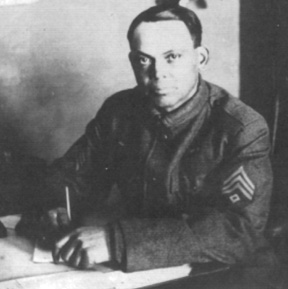 Vance Hunter Marchbanks cannot be said to be a typical African-American
soldier serving at the time of segregated units in the U.S. Army. He was
an uncommon man, thoughtful, observant, articulate, proud and driven by
a strong code of beliefs. And he was not an African-American but met the
19th century test for a person of color, being white and American Indian.
He was colored of complexion and Negro by acculturation. He tells us: "Being
of dark hue, I was placed in a rather awkward position, like all of my people;
too light for colored and too colored for white. This was a handicap which
grew up with me. Many times I have thought my complexion was a drawback,
rather than an asset. But, after years had -passed, it seems to me the greatest
handicap in life is not color or race or creed, but the quality of ability,
honesty, tenacity, and efficiency. ...Being of the mixture I am, I believe
I can judge without prejudice, and write the story of my life with unbiased
motives."
Vance Hunter Marchbanks cannot be said to be a typical African-American
soldier serving at the time of segregated units in the U.S. Army. He was
an uncommon man, thoughtful, observant, articulate, proud and driven by
a strong code of beliefs. And he was not an African-American but met the
19th century test for a person of color, being white and American Indian.
He was colored of complexion and Negro by acculturation. He tells us: "Being
of dark hue, I was placed in a rather awkward position, like all of my people;
too light for colored and too colored for white. This was a handicap which
grew up with me. Many times I have thought my complexion was a drawback,
rather than an asset. But, after years had -passed, it seems to me the greatest
handicap in life is not color or race or creed, but the quality of ability,
honesty, tenacity, and efficiency. ...Being of the mixture I am, I believe
I can judge without prejudice, and write the story of my life with unbiased
motives."
First Sergeant Vance Hunter Marchbanks.
He is brought to our attention because he wrote a manuscript entitled Forty Years in the Army which, thanks to his son, has survived to relate his military experiences, most of which were as a NCO in the 10th Cavalry at Fort Huachuca. Inside the front cover of the Fort Huachuca Museum's copy of the typescript is an inscription by his son, Vance H. Marchbanks, Jr. It says in part that "this manuscript is being passed on to his heirs in order that .they can have some appreciation for the life he lived, and the man he was." The senior Marchbanks. does indeed tell us about the life he lived and the man he was. He promises, "my aim is to write the truth in plain, unmistakable words, and I fear my ability will not permit me to arrange the few words I shall use in such a way as to warrant unusual notice." His narrative also tells us much about soldiering in a white-officered black regiment during critical times in American history.
His actual time in the Army was 43 years, 9 months, and 13 days, by his own reckoning. He wrote the various portions of his narrative at different times between 1932 and 1945.
Since he wrote at least 40 years after his enlistment, we can't be sure what values he brought with him into the Army, which values he accumulated while in uniform, or which he began with and were reinforced by Army life. We can, however, take him at his word when he says he entered the Army as an idealistic country boy, and we know he was an idealist when he left the Army. He says this is what the Army teaches: "If they only taught one to shoot a gun I would say the Army is not worthwhile. But one is taught citizenship, discipline, the power of organization, personal hygiene, and many useful trades in the Army and Navy which prepares one for useful citizenship in any community."
Marchbanks was a Tennessee farm boy; "a 'Country Jake' I was for true." He spent his youth "hunting and fishing,...working on the farm and hauling logs and lumber.... It seems to me that I alone loaded, hauled to the railroad and reloaded in cars enough lumber of various kinds and dimensions to build a city as large as Chicago or San Francisco ......"
Because he was expected to work on the farm in his teens, he went to school only three months a year and had. accumulated only 30 months by his sixteenth birthday, the level, Marchbanks calculated, of an eight-year-old. He recognized that a city boy would have an advantage over him, having put in 90 months by that time. He "always regretted the poor start" he got "in education." But despite his "poor start," he became ' a well educated man, as demonstrated by his awareness of the events of his times and by his expressive prose. He also managed to get in some college, attending Central Tennessee College in Nashville, "a splendid Christian school taught by northern white people," for 15 months. This led to a teaching job.
I taught school in the.fall of 1894 in Jackson County at GaInsborough, Tennessee, on the Cumberland River, 25 miles from my home. Imagine an eighth grade student teaching one of those three month schools where the most advanced students were in the 2d grade. The salary was $25 per month and I had to pay for room and board out of that. On Saturday I worked in a barber shop and would make 50 cents or $1.00 extra. This was one year before I enlisted in the Army. It was in the fall of 1894 that I returned to Nashville, and entered Central Tennesse College to stay in school about five months when I returned home and helped make a crop.
He had to decide, in his own words, whether to "endure the backwoods of the south, live and die in the community where I was bom," or "forsake the land of my youth, and take my chances with an unknown world." His decision was made easier for him because his 70-year-old father was "alert and active," and his 30-year-old mother "was in the prime of life." Since his parents were "well-to-do country folk," he "felt free to ... hit the trail" for himself. As Marchbanks explained, the "soldier bug" had bitten him as a small boy. So in 1895, the 19-yearold Marchbanks turned his back on the Cumberland Mountains and the Tennessee farm and chose a world unknown to most Americans, the closed fraternity of the U.S. Army.
After laying in his last crop, he was sworn in after being given a physical exam on August 2, 1895 in Nashville, Tennessee. He says, "I might have told the Recruiting Officer I belonged to the white race.... But I told him I was colored and he assigned me to the 9th Cavalry." He asked to be assigned to the cavalry rather than the infantry because he "knew the difference between riding and going on foot." On the farm he had ridden "horses, mules, calves, and even stick horses" and "was fond of horses."
The everding of his enlistment, Marchbanks found himself on a train to Jefferson Barracks, Missouri, wrapped up in an Army-issue blanket, and crying himself to sleep. He missed his family. "The next morning I arrived in St. Louis. I had never been so far away from home before. All faces seemed strange."
... as I look back on myself, as I was then, I wonder If ever there was a boy launched who was more poorly equipped to face the perils and hardships on the sea of life than I was. The only essentials with which I was equipped were a strong body and willing hands, a warm sympathetic heart with a profound respect for law and authority, and a reverence for a Supreme Being. I wanted to learn and was not satisfied just to grow up in the backwoods of Tennessee.
Those first weeks in the Army left on him, as they leave on all who share those experiences, an unforgetable impression.
... It was very early in the morning when the train from St. Louis made a somewhat abrupt stop at Jefferson Barracks, Missouri. It was on the third day of August, 1895. The sun popped up bright and hot. The lazy Mississippi was just ebbing along by the Reservation. And as I climbed the long flight of steps that lead to the parade ground, I glanced back over my right shoulder to observe the "Father of Waters" as it slowly flowed southward. For a moment from the top of the steps, I stood and gazed at the fishermen's boats as they ambled along the opposite bank, and watched the smoke of the train as it disappeared in the distance.
The aroma of frying bacon and roasting coffee oozing from the troop kitchen filled the air with a fragrance peculiar to an army camp. Once the smell gets up one's nose, it lingers indefinitely. More than forty years have passed since my first impression of an Army Post, but close contact over this long period, puts me in a position to appreciate the many educational and practical advantages incident to an Army career.
Marchbanks may be too hard on himself when he characterizes himself as being "beyond a reasonable doubt one of the greenest recruits ... who was ever sworn in, or who ever wore the uniform of a soldier...." But like all recruits, he came around after some training. He says,
... however, to be green about the army is not such a great handicap after all, because when they start to teach one in the army they start from the beginning. That is one reason army training is so useful because its so thorough. Nothing is taken for granted and one is not ordered, persuaded or advised to "bite off more than one can chew... " Instructors are selected with care and they usually know their job when they are detailed to instruct recruits.
After recruit training at Jefferson Barracks, Marchbanks joined his regiment at Fort Robinson, Nebraska, where he spent the balance of his first enlistment.
It was a typical Western,town --- saloons on every corner, and gambling tables of all kinds in each saloon. There must have been churches and schools, but I never saw any, except in the Army post. I had been reared by Christian parents and taught from childhood to obey the ten commandments. However, my Christian training and respect for the Deity was not strong enough for me to start a revival, or even a crusade, against vice and wickedness. I fell in with the herd, so to speak; although I was frr from vice, I was "Nobody's Angel."
In the fall of 1897, Marchbanks was reassigned from Company A, 9th Cavalry, to the hospital corps. After the explosion aboard the U.S.S. Maine, war was declared against Spain on April 6, 1898. With only a few months remaining on his enlistment, Marchbanks; did not leave with the 9th Cavalry or the medical detachment for the fighting in Cuba. He took his discharge on August 1, 1898, and went back to Tennessee to visit "the girl of my dreams Miss Lulu B. Martin" in Mayville, Kentucky, and his parents in Tennessee. Little more is said of Miss Martin, perhaps because this would not be the woman he married.
His civilian interlude was brief. Seven days later he reenhsted in Nashville, feeling that "the Army would be a failure without me." Having reenlisted during the Spanish-American War, he was exempt from service in the Philippines if he so desired. So he was discharged a second time on February 22,1899. He reenlisted again on March 1, 1899, this time receiving the assignment he wanted to his old regiment, the 9th Cavalry. Troop L was stationed at Fort Huachuca, Arizona.
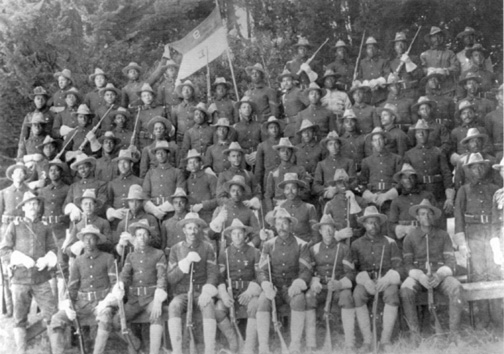
Troop E, 9th Cavalry, in San Francisco in 1900 before
departing for the Philippines.
On March 7,1899, the 23-year-old Marchbanks got off the train at Huachuca Siding and crowded into the Doughtery Wagon, a kind of Army stage coach, that took him the final seven miles to Fort Huachuca. There were seven other recruits in the wagon and two "small and good looking" Mexican girls sitting up front with the driver. The Dougherty wagon dropped the girls off at the Chinese restaurant and took the recruits to the post headquarters which at that time was located in quarters no. 22104 at the canyon,end of officers' row.
There were five companies at the post when Marchbanks arrived. Companies A and H of the 25th Infantry and Troops K, L and M of the 9th Cavalry. Lieut. Col. Daggett of the 25th commanded the post. Marchbanks remembered him because when Daggett got ordered to the Philippines, he had his horse shot rather than leave the animal behind. Marchbanks thought it a 'cruel thing to do."
He also remembered one of the colonel's orderlies. Marchbanks tells the story:
... It seems that this soldier was orderly for the CommandIng Officer. In those days at Guard Mount, which was always formal, the neatest appearing soldier was selected as orderly for the Commanding Officer. He could stay at his quarters at night, but during the day he would accompany the Commanding Officer about the Post. When the C.O. was in his quarters, the orderly would walk up and down in front of the quarters, or sometimes sit on the front porch. He would, of course, do whatever he was ordered to do. On this particular occasion, the C.O. staked his milch cow on the front lawn to eat the grass, this was even before lawn-mowers, and the orderly was directed to mind the cow while she mowed the grass and to not permit anyone to walk across the lawn except the cow. One of the other officer's wives happened to be calling at the C.O.'s Quarters, and upon leaving she started to cut across the lawn; the orderly stopped her, saying, "Lady, you can't cut across the Colonel's lawn --- you must keep to the walk --- it's the Colonel's orders." Whereupon the lady, who was a new arrival on the Post, became very indignant, placed her hands on her hips and said, "Do you know who I am, soldier?" The orderly replied, 'No, ma'am, I don't know your name, but I do know you ain't the Colonel's cow."
Marchbanks left Huachuca just a few months after his arrival when the 9th Cavalry was ordered out to Fort Brown, Texas, in May. He would return 13 years later in December 1913 with a new unit---the 10th Cavalry. He was now a First Sergeant in Troop C and married with two children.

NCOs of the 10th Cavalry around 1902. [The Squadron Sergeant Major, top row, left, still wears the chevrons authorized from 1899-1902 while the rest of the men wear the chevrons in use from 1902-1916.] The regiment was then at Fort Robinson, Nebraska. Seated from left to right: Regimental Quartermaster Sergeant B.A. Anderson, Sergeant Major Presley Holliday, Commissary Sergeant William H. Hill. Standing from left to right: Squadron Sergeant Major Paschall Conley, Color Sergeant Adam Houston, Color Sergeant J.C. Pendergrass, Squadron Sergeant Major Eugene P. Frierson. Q.M. Sergeant Anderson won a bronze medal in the 1903 Department (Missouri and Texas) Cavalry competition. Adam Houston, as 1st Sgt of Troop C, 10th Cavalry, was recommended for a Medal of Honor for his gallantry in the Battle of Santiago, July 1,2, and 3, 1898. Frierson retired but returned to the Army in 1917 to receive an officer's commission and train black troops for the newly organized 93d Infantry Division.
He arrived in the "barren plains of Arizona" on December 19, 1913, to replace the 5th Cavalry with which his regiment was changing not only station, but horses and equipment as well.
Almost immediately upon our arrival at Ft. Huachuca troops were dispatched to different outposts on the Mexican border some to Nogales, Naco, Lochiel, Arivoca, etc. For a while my Troop C was permitted to stay in post, which was gratifying to me since I could be at home with my wife and two children.
We were fortunate to get quarters consisting of two floored hospital tents which was our home until the fall of 1914. My troop was ordered to Yuma, Arizona, in April 1914, and stayed there until the latter part of September some year. However, in July I secured a furlough and went home to build a house with a hope of making the family comfortable before winter, which I did. One handicap followed another and we found ourselves with two youngsters of school age on our hands with no school to attend. For awhile we, with others like us employed a teacher who conducted a private school mixed with children of the officers and enlisted men of the 10th Cavalry who then felt the common touch of comradeship and mutual helpfulness, which rarely existed a few years later.
... The period 1913 to 1917 was one of unrest and uncertainty. The Mexicans were continually on the war path, There was an intense apprehension among the soldiers that sooner or later something was sure to happen, and it did happen. To add disaster to discomfort, Villa's gang of outlaws and desperados made a raid on Columbus, N.M. on the night of March 15-16, 1916, which sent the so called "Punitive Expedition" into Mexico, where my regiment stayed eleven months. Lucky for me I was left back in post during the entire period, for the most part on duty at Post Headquarters acting as Post Sergeant Major. Later on I was on duty in the Post Commissary.
We had sent our children to Chicago in 1915 to live with Master Sergeant and Mrs. Henry McCormack, retired. This was done in order that they could attend school there. While it cost us nearly all we made to keep the children in school, we figured it would be better for them in the long run to acquire an education even if we were poor. I always had a horror to being poor, ignorant and uneducated. I had seen so much of this as a boy in that part of Tennessee where I was born and brought up.... I was lucky enough to get two trips to Washington, D.C. in 1916, both times as a guard conducting patients to the hospital for the insane. In passing through Chicago I had an opportunity to visit our children twice while there.

Hospital tents with wooden platform floors sometimes
used to house enlisted
men's families at Huachuca in 1914. Photo courtesy Charles Grierson collection.
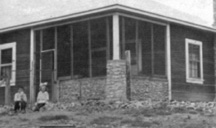 ----------
----------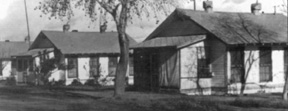
Single NCO quarters in May 1914. U.S. Army photo.
----------------Repainted
exteriors, NCO quarters, in 1936.---------
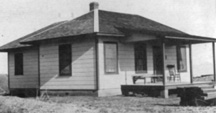
NCOs'quarters, frame, $625, completed on 11 January
1916.
After being commissioned a captain of infantry and serving as a company commander in the 368th Infantry in France, Marchbanks returned to the U.S. and enlisted again as a sergeant of cavalry, unassigned. He taught for a while at A & I Teachers College in Nashville, Tennessee, before receiving orders to rejoin his regiment, the 10th Cavalry. He wrote:
It seemed not to matter where I went, sooner or later we would be sent back to Fort Huachuca. I stayed there from September 1920 to September 1921 when we were ordered back to the Philippine Islands, but after staying over there two years we were ordered back to Fort Huachuca. The lost time we were stationed there from November 1923 to February 1932....
Take it all in all our lost nine years at Fort Huachuca was pleasant and profitable. We were back with our old regiment and friends we had known so long. For the old 10th Cavalry, I shall always hold a warm spot in my heart because I had served with this regiment during the "heydays" of my life. My children were born in the regiment and I had seen many of my dear friends come and go. I loved the spirit of the old regiment and its motto "Ready and Forward."
... We did not hate the place, and it offered nothing to make us love it, except the everlasting hills, and babbling brook coming out of Huachuca Canyon. The wide plains covered with sage brush, grass, mesquite, and cactus of many varieties, and inhabited by rattle snakes, cotton tails, jack rabbits, and hoot owls. The summers are not very hot and the winters are not very cold: the falls and spring are delightful, and the elevation being a mile above sea level, the air is always delightful and fresh.
Marchbanks documented the end of an era at Fort Huachuca, the departure of that post's most famous unit, the Buffalo Regiment.
The Tenth Cavalry was stationed at Fort Huachuca Az. 18 years, 1913 to 1931. When the regiment received orders for change of station in the fall of 31, "which was done as an economic measure and to make room for an Air Corps Unit, " the colored press and citizens throughout the United States petitioned the War Department to stop the movement but without success.

The 10th Cavalry on parade at Huachuca in the 1920s.
On October 10th the movement started, Headquarters Troop and Troops A and B went to Fort Leavenworth, Kansas, to absorb the Colored War College Detachment.
At that post, Troops E and F were transferred to West Point, N.Y. to absorb the Cavalry detachment on duty at the U.S. Military Academy, and the Machine Gun Troop moved to Fort Myer, Va. to absorb the service detachment at that post.
The band, one of the best in the Army, was dissolved and its personnel transferred to the 9th Cavalry and the 24th and 25th Infantry, hence the curtain goes down on one of the most efficient and picturesque regiments that was ever in the Army, so far as fighting and training units is concerned....
(In February 1932) we were ordered to Little Rock Air Depot, Little Rock, Arkansas, where we stayed until February 1934, when we were ordered to Washington, D.C.
From March 1934 to October 1939, 1 was on duty in the Nation's Capitol, with the Washington High School Cadet Corps. It was a pleasure to have served with this unit, and the splendid contact made while there makes this five and one-half years of my most pleasant and profitable. Because while there my son was able to finish his medical education, and it was only because we lived in the city and he boarded at home that we were able to help him on our limited compensation, and pay from the government.
In 1927, while Marchbanks was living at Fort Huachuca, he was asked to give a talk to a convention of Sunday School teachers at McNary, Arizona, a "lumber camp town of about 1,500 people." [In 1924 the town became known as McNary after the name of the lumber company which bought the property in that year. The place had formerly been known as Cooley and Cooley's Ranch, a stopover for Marchbanks when he was at Forts Wingate and Apache. A number of African-American men were imported to work in the sawmill, so it is likely that his audience was largely made up of blacks.] The subject of his speech was to be "Reminiscences of a Trooper at Fort Apache in 1900." After talking briefly about his experiences around Fort Apache, Marchbanks then goes on to make an eloquent statement about patriotism, about the contributions of the "colored soldier" to the nation, and about racial injustice. As a colored soldier, he felt he had duties beyond the battlefield.
While the primary object of the soldier is to prepare for war, he realizes very seriously that the new patriotism has other duties than those of armed conflict duties less splendid, but no less brave, requiring a bravery of a greater order than which shown upon a hundred battlefields of our World War....
The colored soldier has fought bravely In the Revolutionary War, the Civil War, the Spanish-American War, and the World War. But the negro will not be given justice through the valor and bravery he displays in the war. It will be through the cooperative efforts of every member of the Negro Race intelligently pleading his case before the public. There are millions of American White people who are ashamed of the treatment accorded the Colored American in the United States, and his case will have to be presented until there are millions more who are ashamed of the way he is treated before he will be given a square and equal chance here.
Ladies and Gentlemen: In recalling to my memory that it was through these woods; over these very hills and mountains that you now behold, that members of my regiment, some of whom have long since crossed over the great divide, rode after Geronimo, and the Apache Kid, and displayed valor and gallantry that is unknown to history. It was these men who made it possible for you and me, and all the inhabitants of the Southwest to live here in peace and tranquility.
Notwithstanding all these hardships, sufferings, and deaths sacrificed for the sake of civilization, at this time, people of the Negro Race are not permitted to vote in the primary elections in the State of Texas, and they must ride in "Jim Crow" cars on the railroads, and worse than all, once in a while one is hanged or burned at the stake without being given a hearing before a court of justice.
Let us hope that the time will come when opportunities and accommodations, justice in the courts, justice in the communities and equal rights in all respects will not be denied to any person on account of race or color.
We will never be able to get what we want in this country until we are willing to organize and stand together as one man on things essential to the welfare of our people as a whole.
... If you want equal rights in this country, if you want to make yourselves felt, if you do not want your children to wait long years before they have the bread on the table, the leisure in their lives they ought to have, the opportunity in life they ought to have; if you do not want to wait yourselves, write on your banner so that every political trimmer can read it so that every politician no matter how shortsighted he may be can read it, "We Never Forget, We Never Forget, We Never Forget. "
There was a proud tradition of soldiering in the Buffalo Regiment at Huachuca. Many of the sons of soldiers were reared at Huachuca and followed their father's footsteps by chosing military careers, many in the same regiment. Marchbanks said, "Huachuca has not only been a training center for soldiers, it has been a sort of incubator for them over a period of many years." He spoke in 1941 with paternal pride of his own son, Major Vance H. Marchbanks, Jr., a medical officer who was then serving with the 332d Fighter Group in Italy.
At an age when summing up is expected, Marchbanks, wrote down what he considered the plus and minuses of his Army life.
The sad part of my life, as I look back upon it, was that I did not use the opportunities that were mine. It was either through lack of ability, or lack of early literary training, or both, that I did not attain the goal which I would have cherished in my old age. But, after all, my life was not a complete failure, and it has many pleasant reminiscences which I can look back upon with some degree of pleasure. To have lived through three wars; viz. the SpanishAmerican, the Philippine Insurrection, and the World War, and to have been in active duty though not actually engaged in all of these should be some consolation.
... Not only was I able to assist my son in securing a medical education, but I was able to apply my military knowledge and experience to thousands of young men in the Washington High School Cadet Corps.
I have made an humble effort to serve my country well as a soldier and a citizen. I have no excuses to offer for my failure or success. I am willing to rest my case. Should I have possessed more education and more ambition in my early days my case might have been different, as it was and Is the water has gone over the dam. Not all of it, however, and as long as I live I shall continue to hold my head high, and move forward.
Marchbanks' writings about his Army experiences have done much to illuminate the soldier's life at a time when America was largely estranged from its tiny standing Army. He becomes part of the Buffalo Soldier tradition about which lie felt so strongly. And his sincere written record enables succeeding generations of American soldiers to join him in his invocation: "We Never Forget."(58)

Troop F, 10th Cavalry, in front of their barracks
at Huachuca in 1931
Footnote:
58 Marchbanks mss.
23. U.S. Army Lifestyles at Huachuca in the 1920s: Recreation